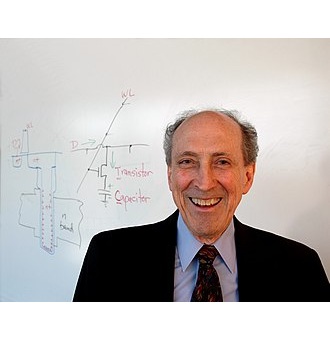| Remembering Robert Dennard, Inventor of DRAM |
| Written by Sue Gee |
| Sunday, 19 May 2024 |
|
Robert Dennard, the IBM engineer who invented the key memory technology DRAM that we now rely on in our computers smartphones and tablets, passed away on April 23rd, 2024, at age 91. Born in 1932 in Texas Dennard had a "very humble upbringing" to quote his own words. He grew up on a farm with no electricity and attended a one-room schoolhouse. At high school, he was a good student, especially in math, but it was his musical talent playing the E-flat bass in his high school band that led to him being offered a scholarship to Southern Methodist University where he switched his attention to electrical engineering. From SMU Dennard moved to the Carnegie Institute of Technology, now known as Carnegie Mellon to continue his studies. After completing his PhD in 1958 he began working as a researcher for IBM, remaining with the company for his entire career. In the 1960s, computers were room-size machines and were slow. But change was taking place. At Fairchild and Texas Instruments, Robert Noyce and Jack Kilby were independently working on using silicon-based transistors to store digital bits of information. At IBM Dennard too was focused on the emerging field of microelectronics, delve into the designs and applications for the metal oxide semiconductor field-effect transistor (MOSFET). According to Jeff Butts, writing on Tom's Hardware: Frustrated with the size and power requirements of existing magnetic-core RAM, Dennard and a team of microelectronics specialists developed an alternative system in 1964 that required only six MOS transistors to store one bit of information. Even that design was, they felt, too complex and slow. Dennard then had a light bulb go off in his head that would revolutionize computing. He began researching how he might store a bit of information in one transistor instead of six. That insight, investigation, and experimentation would eventually lead to the invention of dynamic random-access memory (DRAM.) This discovery opened the door to previously unimaginable improvement in data capacity, with lower costs and higher speeds all using tiny silicon chips. Dennard also outlined a theory that has helped computers and other electronic devices to get smaller, faster, and more efficient each year. The principle, known as Dennard scaling, can be considered as complementary to the Moore's Law, the prediction made in 1965 by Gordon Moore, who went on to co-found Intel, that the number of transistors that could be crammed onto a silicon chip could be doubled about every two years. Debuted in an initial paper in 1972, and fleshed out in another two years later, Dennard described the physics that would allow transistors to shrink and become more powerful and less costly, even as the energy each one consumed would remain almost constant. Over his career Dennard produced 75 patents and received several scientific awards, including the National Medal of Technology from President Ronald Reagan in 1988 and the Kyoto Prize in advanced technology from the Inamori Foundation, in Japan, in 2019.
More InformationRobert Dennard (New York Times Obituary) Robert Dennard, father of DRAM Related Articles Intel - The Microprocessor Revolution
To be informed about new articles on I Programmer, sign up for our weekly newsletter, subscribe to the RSS feed and follow us on Twitter, Facebook or Linkedin.
Comments
or email your comment to: comments@i-programmer.info |
| Last Updated ( Monday, 20 May 2024 ) |



